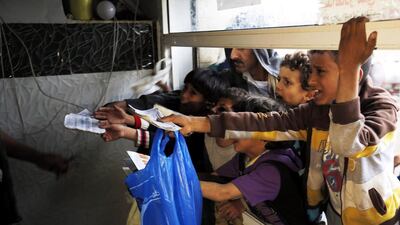The UN has brought in the world’s largest relief operation in Yemen, reaching 10 million people a month, in part due to aid from the UAE and Saudi Arabia, the world body's aid chief said on Wednesday.
Yemen’s war has devastated its economy and created the world's biggest humanitarian crisis, with nearly 24 million people in need of urgent assistance.
UAE and Saudi assistance has prevented the situation from deteriorating, Mark Lowcock said in Riyadh on Wednesday.
“My most important message is to say thank you very much [to the UAE and Saudi Arabia] because without them the country would be much worse,” Mr Lowcock said.
The two countries' donations to the UN have amounted to hundreds of millions of dollars and were instrumental in scaling up the aid operation, he said.
"This is the best practice in humanitarian support and donorship," Mr Lowcock said.
The UAE and Saudi Arabia are working with humanitarian organisations to ensure that aid is distributed in Houthi and government-controlled areas.
In January and February, 130 agencies worked together to provide 9.8 million people with food, water, health care and other assistance.
In March, the World Food Programme fed 10.6 million people, the highest figure ever.
But Mr Lowcock said that between five and 10 per cent of aid did not reach those in need after being diverted.
“The best way to prevent this problem is to make it clear that there will be zero tolerance for it,” he said.
Humanitarian agencies are facing many challenges in reaching the people of Yemen, Mr Lowcock said.
The World Food Programme warned that it would suspend its operations in Houthi-held areas if the rebels continued to block aid.
Houthi authorities have interfered with food distribution and have denied access to aid workers of areas that are most in need of assistance, the agency said on Monday.
It said previous negotiations with Houthi leaders on independent access to the hungry were yet to yield results.
This is not the UN agency's first warning to the Houthis. In December it said the rebels were stealing "from the mouths of hungry people".
“We will not tolerate this,” Mr Lowcock said.
He said that even wars had laws that “need to be complied with”.
Mr Lowcock met leaders of the Yemeni government including Prime Minister Maeen Abdulmalik Saeed and Foreign Minister Khalid Al Yamani to discuss delivery of aid to those in need.
They also discussed ways of preventing the Houthis from stealing and diverting aid, Mr Saeed's office said.
“No one should want the victims of this problem to be the starving people of Yemen,” Mr Lowcock said.
Last month Saudi Arabia and the UAE pledged $200 million in aid to Yemen for Ramadan.
The funding is part of $500m in donations announced in November last year to urgently relieve the suffering of the Yemeni people.
The war in Yemen broke out after Iran-backed Houthi rebels took control of the country's capital city, Sanaa, in 2014.


